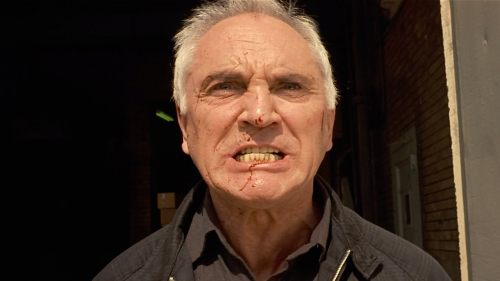Soderberghopolis #1: Yes to SEX
I’m focusing almost exclusively on the movies and mostly ignoring outside things like when he married or had a love child with whom, when he went to get coffee wearing his pajamas, and all that TMZ shit. I’m including shorts, features, and TV shows in one big inclusive pile.
Also note that while I’ll be brutally honest and not pull punches, Soderbergh is one of my favorite directors because I tend to really love his films. As a by-product of this, I tend to enjoy those that most people hate or didn’t see. The good news is that the comments are there for you to hate on me (tactfully) to your heart’s content!
Before anyone asks, I own all of these titles that are available to own, and re-watched them before writing about them (except where noted). On that note, in tomorrow’s installment, you’ll see a couple of reasons why I’m glad I’ve been slowly working on this since June! I’m including how you can watch all of them, including links when appropriate.
Most people think of sex, lies, and videotape as Soderbergh’s first feature, but it isn’t! He started out with a concert film, of all things.
1) Access All Areas (1985)
I won’t pretend to be the world’s biggest Yes fan, but I was somewhat familiar with their general history and 90125 (named after the record company catalog number for the album), their big comeback record from 1983. 9012 Live, the concert film made during their ‘84-‘85 tour for the album, was Steven Soderbergh’s feature directorial debut. Access All Areas, a 24-minute behind the scenes doc, got him the 9012 Live job.
It’s interesting to see the musicians and their staff constantly tell him to “stop recording” and “shut that shit off”. One bit foreshadows the improvisational style found in Soderbergh’s more recent work (like The Girlfriend Experience, Unscripted, and so on), particularly a bit with a woman talking about how her friends make fun of her for watching and enjoying the Oscars.
2) Yes: 9012 Live (1985)
9012 Live opens with 1950s stock footage from who knows what. “Alex,” a sharp young fella, is over at the house of “Judy,” talking with her and “Judy’s Pop” about the music of industrial machinery. Some hilariously stupid banter occurs and then Judy’s Pop tells Alex to feel free to avail himself of the record player. Judy tells him to “Pick something groovy, Alex” and starts dancing enthusiastically. Alex then puts on something decidedly not groovy, and we segue into the concert. This piece is in both the original and the Director’s Cut (more on that in a bit).
The style of a concert film doesn’t have much in common with the language of narrative films, which compose the rest of Soderbergh’s filmography. The only element of 9012 Live re-used in sex, lies, and videotape is Jon Anderson’s haircut, which was passed down to James Spader. I expect five people to get that joke.
[caption id=“attachment_15180” align=“aligncenter” width=“575” caption=“The haircut in question”]
[/caption]
The original release version of 9012 Live has a bunch of 1950s stock footage mixed with neon-infused computer effects to pointless, boring effect. The urge to please by imitating the MTV-pop aesthetic screwed up lots of good things back in the mid-1980s, and this was one of them. On the DVD release, they’ve included Soderbergh’s director’s cut, which thankfully eliminates all that crap.
When you take all the extra effects-modified stock footage out, it’s a much better movie. It holds up well due to brilliant editing choices, which keep you engaged in what’s going on. The only things that really fuck with soaking it all in are those stupid “enhanced” stock footage bits. If you’re a Soderbergh fan who hates prog rock (or Yes in general), you probably won’t dig this and should stick with Access All Areas.
Random Trivia
Yes guitar player Trevor Rabin went on to score tons of movies (which were mostly terrible), most famously Remember the Titans and the track “Titan’s Spirit”, the theme played at many Olympics since then as well as at Obama’s Election Night victory speech in 2008.
How to Find Access All Areas and 9012 Live on Video
Both are on a 2006 DVD released by Image Entertainment in the US that runs a little under $20 (blame the regularly-high prices of concert DVDs). Avoid any other versions. The disc includes deleted track “Roundabout”, the Access All Areas doc, and band interviews shot by career-long Soderbegrh collaborator Larry Blake (sound mixer and editor). Amazon offers the flawed non-Director’s Cut version of 9012 Live via streaming for $2.99.
3) Winston (1987)
I haven’t seen this short film, which Soderbergh made back home in Baton Rouge. It’s what would propel sex, lies, and videotape into existence. It’s supposed to be very much in the same vein as sl&v, in that it deals with how people deal with sexuality and interpersonal conflict. I have no idea if it’s on some DVD I’m unaware of, or what. It’d be a great addition to a future Criterion release of one of his feature films. Soderbergh would later say that he felt this film failed in execution due to being too close to his real-life experiences that inspired it.
4) sex, lies, and videotape (1989)
Even though he’s so well-known for this film, it’s the one that I feel the least compelled to write much about since so much has already been said. If you haven’t seen it, this is the best starting point you could go with in terms of filling gaps.
In short, it’s about an unfaithful husband (Peter Gallagher), his wife (Andie McDowell), and her sister (Laura San Giacomo), as well as an old friend of his (James Spader), whose sudden reappearance changes all of their lives irrevocably. It explores themes of sexuality and morality against the backdrop of Spader’s character recording women talking about their feelings about and relationships with sex as a part of their lives.
As many times as I’ve seen it, James Spader’s Cannes Best Actor-winning performance as Graham is compelling and engaging every time. The character is so unlike what people know him for of late (Boston Legal, Secretary). He’s socially awkward and a little weird, but is otherwise not intimidating as a silent predator. This signature role dramatically distanced him from the John Hughes work he’d done previously, and lead to projects like David Cronenberg’s Crash.
The sex talk parts of the movie are less shocking now than they were then, but the combustible friction between the characters is as volatile as ever. The film holds admirably when compared against the glut of Miramax-Sundance-Cannes product that got churned out in the ‘90s. There were many, many great films that came out of that era, but this one is more than just memory of hype, like I find some of the others to be upon revisiting them.
Soderbergh won the Palme d’Or at Cannes with this film at the age of 26, which, to hear him tell it, was a blessing and a curse (more the curse). To be a wunderkind is one thing. To have impossibly-high expectations forced on you is another.
Without anyone’s permission, here are the Criterion laserdisc liner notes written by Michael Dare in 1990. Don’t read them until you’ve seen the movie.
How to Find sex, lies, and videotape on Video
There’s an ancient 1998 DVD release (and VHS before that), but there’s a much better 2009 20th Anniversary Blu-ray.
The Blu includes a great 1998 commentary with Soderbergh and Neil LaBute. You’ll find that every feature commentary Soderbergh has done is a wonderful listen. Among many other things, he touches on how the expectations following this film kinda cursed him returning to Cannes 4 years later with King of the Hill (a tragically ignored movie I’m writing about tomorrow).
One of the coolest things to happen in recent years is the addition of vintage Criterion Collection laserdisc features to select Sony Blu-rays, and this is no exception, with three great carry-overs from the 1990 Criterion laser. First up is a quick piece with Soderbergh talking about the trailers, and how he liked his minimalist, evocative trailer just fine…but Miramax had a fit and demanded it re-cut. Soderbergh is more generous to them in the clip here than in the more recent commentary. Along with it that is a deleted scene (featuring Andie McDowell and her therapist) with optional commentary by Soderbergh. Finally, we’ve got an 8-minute vintage interview with Soderbergh in which he talks about how he was influenced by The Last Picture Show and Five Easy Pieces, among other things. He talks about his actors and sex as a subject matter. Short, but sweet. On top of that, part of it takes place on a bench and then follows him into a car.
Also included is footage from the 20th Anniversary cast reunion at Sundance 2009, but it’s only 3 minutes long and is missing Spader.
I dearly love that Larry Blake, long-time Soderbergh collaborator, has written laserdisc-style remastering and restoration notes included in text form on-screen.
It’s usually less than $10 on Amazon. That really is a steal.
In the Next Installment of Soderberghopolis
We look at the director’s mind-bending, kafkaesque Franz Kakfa movie, his Depression-era studio picture starring a young Jesse Bradford, a post-Noir shot in Austin, Soderbergh’s first of two Spalding Gray movies, and the amazing and absurdist film that this series is named after, Schizopolis! Until tomorrow, feel free to love, hate, or debate these films in the comments.



